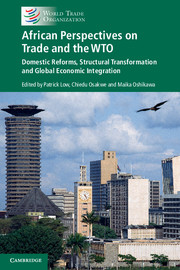 African Perspectives on Trade and the WTO
African Perspectives on Trade and the WTO Book contents
- African Perspectives on Trade and the WTO
- African Perspectives on Trade and the WTO
- Copyright page
- Contents
- Figures
- Plates
- Contributors
- Message
- Joint Foreword
- Book part
- Glossary
- Disclaimer
- 1 Introduction and Overview
- Part I The Future of the Multilateral Trading System: Perspectives from African Policy-Makers and Partners
- Part II Africa’s Participation in the Rules-Based Multilateral Trading System
- 10 Rising Africa in World Trade? A Story of Traditional Commodities and New Products
- 11 Trade Policy Trends in Africa: Empirical Evidence from Twenty Years of WTO Trade Policy Reviews
- 12 Preferential Trade Agreements in Africa: Lessons from the Tripartite Free Trade Agreements and an African Continent-Wide FTA
- 13 African Trade Integration and International Production Networks
- 14 Implementing Trade Facilitation Reform in Africa
- Part III Selected Development Experiences and Perspectives
- Book part
- Index
- Plate Section (PDF Only)
- Book part
- References
10 - Rising Africa in World Trade? A Story of Traditional Commodities and New Products
from Part II - Africa’s Participation in the Rules-Based Multilateral Trading System
Published online by Cambridge University Press: 27 October 2016
- African Perspectives on Trade and the WTO
- African Perspectives on Trade and the WTO
- Copyright page
- Contents
- Figures
- Plates
- Contributors
- Message
- Joint Foreword
- Book part
- Glossary
- Disclaimer
- 1 Introduction and Overview
- Part I The Future of the Multilateral Trading System: Perspectives from African Policy-Makers and Partners
- Part II Africa’s Participation in the Rules-Based Multilateral Trading System
- 10 Rising Africa in World Trade? A Story of Traditional Commodities and New Products
- 11 Trade Policy Trends in Africa: Empirical Evidence from Twenty Years of WTO Trade Policy Reviews
- 12 Preferential Trade Agreements in Africa: Lessons from the Tripartite Free Trade Agreements and an African Continent-Wide FTA
- 13 African Trade Integration and International Production Networks
- 14 Implementing Trade Facilitation Reform in Africa
- Part III Selected Development Experiences and Perspectives
- Book part
- Index
- Plate Section (PDF Only)
- Book part
- References
Summary
International trade provides ample opportunities for the economic development of countries and regions. The fall in trade costs – communication and transportation costs, greater access to international capital markets, regional cooperation and, last but not least, the decrease in trade barriers – has supported global trade and output expansion over the last decades. Emerging opportunities and challenges resulting from technological, economic and political developments differ, however, from region to region. Historical experience shows that much of the progress in economic growth and development also depends on the readiness of local business and governments to rapidly adapt and seize opportunities.
This chapter examines a range of questions. How has Africa’s trade evolved since 1995? Did Africa’s trade expand in line with global trade, or faster? Did the region’s exports become more diversified in terms of product structure and market destinations? Did Africa’s trade increase its share relative to GDP? Some observers might argue that an analysis of a large region at an aggregate level can only be of limited value. More than 1 billion people live in Africa, populating over fifty economies that differ considerably in size, resource endowments, governance and openness. Nevertheless, a shared history, combined with common economic experiences and a shared evolving destiny justify a continent-wide analysis of certain trends in trade. This approach should not, however, detract from the reality of Africa’s rich diversity.
But there is also focus on a number of country experiences. The results of analysis indicate that, while they may not be representative, selected countries have recorded an above-average economic and trade growth record over the last decades, although they were broadly representative of the starting baseline for most African countries in 1995, with their exports dominated by agricultural products. The analysis examines what has changed in product and market structure, and factors that contributed to their above-average trade and growth performance.
- Type
- Chapter
- Information
- African Perspectives on Trade and the WTODomestic Reforms, Structural Transformation and Global Economic Integration, pp. 69 - 104Publisher: Cambridge University PressPrint publication year: 2016
